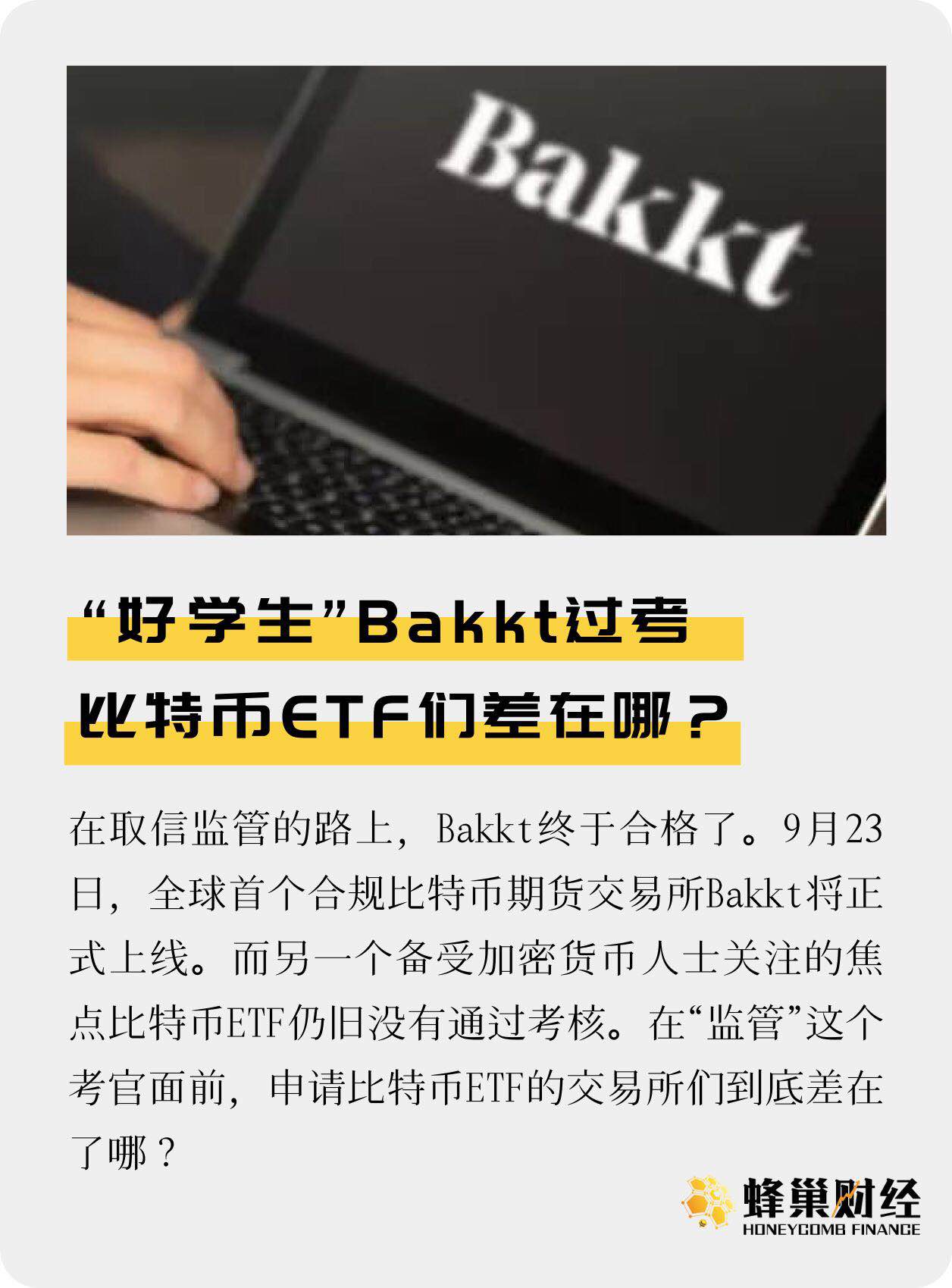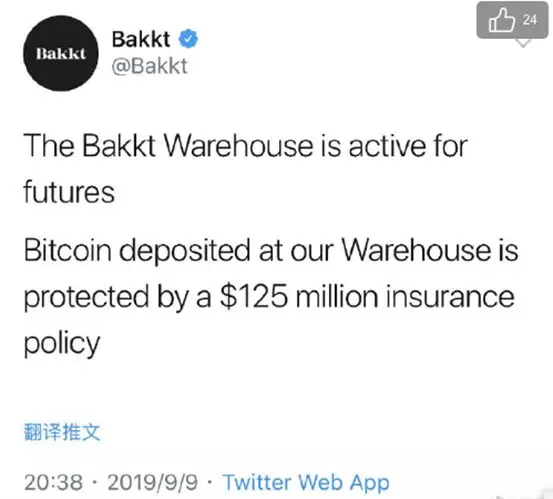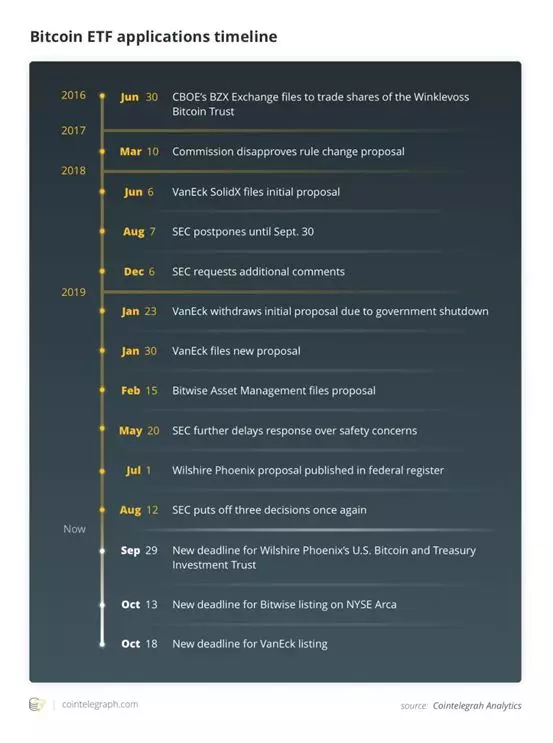Bakkt three-step test, why are bitcoin ETFs all the way?

In less than two weeks, Bakkt, the world's first compliant bitcoin futures exchange, will be officially launched. After nearly a year of "jumping tickets", Bakkt, which has received much attention, has finally had a "head date."
In August of this year, Bakkt was approved by the US Commodity Futures Trading Commission (CFTC) and the New York Financial Services Department (NYFDS). In the “test” process, Bakkt not only prepared for the trust, but also insured the assets.
Regulating this hurdle, Bakkt is like a "children of other people's family" and has become a positive example. Other Bitcoin ETF applicants who wish to get through the checkpoints have been "all the hardships."
- Cycle observation | New cycle? Four possibilities for Bitcoin's future
- Research | Data Compliance, Reptile Technology Interprets Legal Issues
- Swiss FINMA issued a guide to the stable currency, proposing Libra to obtain the necessary conditions for payment of the license
In June of this year, SEC Chairman Jay Clayton reiterated the preconditions for the approval of the Bitcoin ETF – the hosting plan and market manipulation measures. “Hosting is the main question. How does the SEC really know that investors have digital assets?”
The “examiner” has already “exposed the problem”. After Bakkt, whether the Bitcoin ETFs can be accepted and accepted in the future has become the next market trend that most investors are concerned about.
Bakkt "three steps" to take over the supervision
On September 10th, Bakkt officially announced that New York Mellon Bank has provided Bakkt Warehouse with geographically distributed asset storage to protect customers' private key materials.
Bakkt features bitcoin physical delivery mode and supports daily settlement. Its main body of operations is the Intercontinental Exchange (ICE), established in 2000, with capital endorsements from Goldman Sachs, Morgan Stanley and Deutsche Bank, which currently provide over-the-counter services for world-renowned energy, metals and other commodities.
Under the US financial supervision system, the compliance of cryptocurrency trading institutions is particularly important, and the qualification of asset custody is the main assessment indicator.
Bakkt operated by ICE has been approved by the US Commodity Futures Trading Commission (CFTC) and the New York Financial Services Department (NYFDS). In order to meet the latter's requirements for asset custody, in the early days, Bakkt established a trustee, the Bakkt Trust. On September 9th, Bakkt also announced through official channels that it purchased a $125 million insurance service for its bitcoin custody business, which added a guarantee to the custody business.

In addition, Bitcoin physical delivery mode requires Bakkt to have a large amount of bitcoin to meet customer needs.
Institutions in the currency circle have long predicted that Bakkt's launch will become a catalyst for large-scale inflows of funds from traditional financial institutions into the currency market.
The risk rating agency's standard consensus is that Bakkt, approved by regulators, will encourage institutions that want to invest in bitcoin but do not have suitable investment channels to participate in the bitcoin market. "This is why we have long been bullish on bitcoin. ”<
At the end of August, a survey released by Insight Chain (INB) showed that most of the 272 valid questionnaires collected were considered good news. 85.3% of them believe that the appearance of Bakkt Bitcoin physical delivery contract represents the bulk entry of institutional investors; 81.3% believe that this will lead to a large amount of funds entering the currency circle; 62.9% think that after the physical delivery contract is launched, Bitcoin will usher in a rise.
Of course, objectively speaking, participating in a contract transaction does not mean that the organization will collectively bet on bitcoin. After all, on this futures trading platform, customers can also short the bitcoin.
MultiVAC CEO Frank issued a conservative view that the news of Bakkt's launch has been basically digested by the market and will not have much impact on the market in the short term.
Bitcoin ETF card in the "hosting" link
In the long run, the participation of traditional capital is undoubtedly a positive signal for the currency market.
Prior to Bakkt, including the Chicago Mercantile Exchange CME and the Chicago Board Options Exchange CBOE, the compliant bitcoin futures trading business was launched.
After Bakkt, the next regulatory trend that is of concern to most investors is the “frustration” ETF.
The Bitcoin ETF is a fund investment product similar to the gold ETF. The ETF allows investors not to hold Bitcoin directly, but only by holding an ETF fund can achieve the purpose of investing in Bitcoin.
The application for the Bitcoin ETF can be traced back to 2014 at the earliest. At the time, the brothers of the Gemini exchange, Winklevoss, initiated a joint application to the Securities and Exchange Commission (SEC), but after three years of review, they still did not pass. Since then, many companies and transaction service providers have tried to apply for ETF compliance, and the results are either rejected or postponed.
Cointelegraph has produced a timetable for the Bitcoin ETF to be rejected many times in the past four years. This emerging financial product has not been able to enter the scope of regulatory approval.

ETF rejected timetable from 2016 to 2019
In June of this year, SEC Chairman Jay Clayton reiterated the preconditions for the approval of the Bitcoin ETF – the hosting plan and market manipulation measures. “Hosting is the main question. How does the SEC really know that investors have digital assets? It is obviously different from gold or coffee. And other tangible assets.” Clearly, the protection of investors is the most important factor for regulators.
In the field of cryptocurrency, even the head platform such as the currency security will experience various difficulties in entering the cryptocurrency market of the United States, Japan and South Korea. In the native currency industry, how to safely store bitcoin, prove that the store has a self-proclaimed amount of bitcoin or the corresponding amount of funds, has been in the opaque state of "I say security is safe, I said there is", no Public third-party certification and effective intervention without supervision have also kept the industry's original cryptocurrency exchanges and commercial asset managers in a gray area. If the industry is "grey", it will be chaotic and even form a vicious circle.
Encrypted assets in the current regulation of "SayNo" have become the target of investment that cannot be popularized in the market.
Bakkt's practice of obtaining credit supervision has brought about some ideas: the establishment of trust companies, cooperation with third-party financial institutions, asset storage custody, protection of user private key materials, and supporting insurance services. The agency's efforts in asset insurance and trust may provide a reference for cryptocurrency institutions applying for Bitcoin ETFs and other trading platforms that seek compliance.
Interaction time
Do you think Bakkt will bring a bitcoin bull market?
Text: 嚯嚯
Source: Honeycomb Finance
To learn more about the blockchain quality content, please pay attention to the public number: Honeycomb Finance News
We will continue to update Blocking; if you have any questions or suggestions, please contact us!
Was this article helpful?
93 out of 132 found this helpful
Related articles
- Close the back door of the transaction, Zcash is the biggest defect or is solved due to this program
- What kind of consensus algorithm do we need?
- Liang Xinjun: In the next fifteen years, blockchain restructures social production relations
- Encrypted synthetic assets DIY era is coming, UMA brings DeFi new explosion point?
- It’s better to chase the wind than to create the wind – to pay tribute to the participants in the Ant Blockchain Innovation Competition
- Babbitt Column | Cai Kailong: Is Bitcoin a safe haven asset?
- Babbitt column | "Privacy-transparency" binary paradox is broken, blockchain positioning faces crossroads






